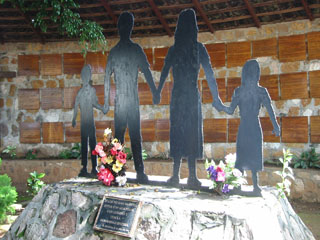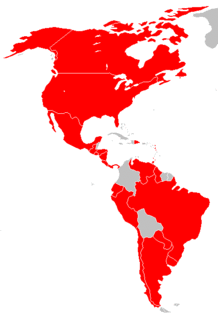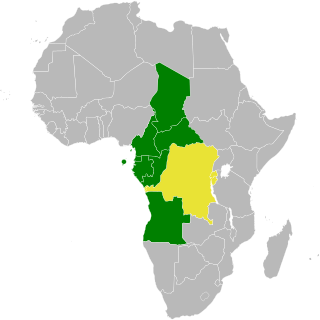
Arms trafficking or gunrunning is the illicit trade of contraband small arms and ammunition, which constitutes part of a broad range of illegal activities often associated with transnational criminal organizations. The illegal trade of small arms, unlike other organized crime commodities, is more closely associated with exercising power in communities instead of achieving economic gain. Scholars estimate illegal arms transactions amount to over US$1 billion annually.

The American Convention on Human Rights, also known as the Pact of San José, is an international human rights instrument. It was adopted by many countries in the Western Hemisphere in San José, Costa Rica, on 22 November 1969. It came into force after the eleventh instrument of ratification was deposited on 18 July 1978.

The United Nations Office on Drugs and Crime is a United Nations office that was established in 1997 as the Office for Drug Control and Crime Prevention by combining the United Nations International Drug Control Program (UNDCP) and the Crime Prevention and Criminal Justice Division in the United Nations Office at Vienna. It is a member of the United Nations Development Group and was renamed the United Nations Office on Drugs and Crime in 2002. In 2016–2017 it has an estimated biannual budget of US$700 million.
The International Narcotics Control Board (INCB) is an independent body responsible for monitoring the control of substances pursuant to the three United Nations drug control conventions, and assisting Member States in their efforts to implement those conventions. It plays an important role in monitoring the production and trade of narcotics and psychotropics, as well as their availability for medical and scientific purposes, and in deciding which precursors should be regulated.

The United Nations Convention Against Illicit Traffic in Narcotic Drugs and Psychotropic Substances of 1988 is one of three major drug control treaties currently in force. It provides additional legal mechanisms for enforcing the 1961 Single Convention on Narcotic Drugs and the 1971 Convention on Psychotropic Substances. The Convention entered into force on November 11, 1990. As of June 2020, there are 191 Parties to the Convention. These include 186 out of 193 United Nations member states and the Holy See, the European Union, the Cook Islands, Niue, and the State of Palestine.
The Protocol against the Smuggling of Migrants by Land, Sea and Air, supplementing the Convention against Transnational Organised Crime, was adopted by the United Nations General Assembly in 2000. It is also referred to as the Smuggling Protocol. It is one of the three Palermo protocols, the others being the Protocol to Prevent, Suppress and Punish Trafficking in Persons, especially Women and Children and the Protocol against the Illicit Manufacturing and Trafficking in Firearms, Their Parts and Components and Ammunition.
The Protocol to Prevent, Suppress and Punish Trafficking in Persons, Especially Women and Children is a protocol to the United Nations Convention against Transnational Organized Crime. It is one of the three Palermo protocols, the others being the Protocol against the Smuggling of Migrants by Land, Sea and Air and the Protocol against the Illicit Manufacturing of and Trafficking in Firearms.
A Federal Firearms License (FFL) is a license in the United States that enables an individual or a company to engage in a business pertaining to the manufacture or importation of firearms and ammunition, or the interstate and intrastate sale of firearms. Holding an FFL to engage in certain such activities has been a legal requirement within the United States since the enactment of the Gun Control Act of 1968. The FFL is issued by the Bureau of Alcohol, Tobacco, Firearms, and Explosives.

Small Arms and Light Weapons (SALW) refers in arms control protocols to two main classes of man-portable weapons.
In the United States, access to guns is controlled by law under a number of federal statutes. These laws regulate the manufacture, trade, possession, transfer, record keeping, transport, and destruction of firearms, ammunition, and firearms accessories. They are enforced by state agencies and the federal Bureau of Alcohol, Tobacco, Firearms and Explosives (ATF).

Luis Alfonso de Alba Góngora is a Mexican diplomat.

The Inter-American Convention Against Terrorism was adopted by the member countries of the Organization of American States (OAS) at its General Assembly held in Bridgetown, Barbados, on 3 June 2002. The Convention, negotiated pursuant to a mandate from the OAS Foreign Ministers shortly after the terrorist attacks of 11 September 2001 in the United States, reflects the Americas' hemispheric-wide commitment to enhancing cooperation in the fight against terrorism.

The Arms Trade Treaty (ATT) is a multilateral treaty that regulates the international trade in conventional weapons.
The National Conference of Commissioners on Uniform State Laws developed the Uniform State Narcotic Drug Act in 1934 due to the lack of restrictions in the Harrison Act of 1914. The Harrison Act was a revenue-producing act and, while it provided penalties for violations, it did not give authority to the states to exercise police power regarding either seizure of drugs used in illicit trade or punishment of those responsible.

The Central African Convention for the Control of Small Arms and Light Weapons, their Ammunition, Parts and Components that can be used for their Manufacture, Repair or Assembly, also known as the Kinshasa Convention, aims at regulating small arms and light weapons (SALW) and combating their illicit trade and trafficking in Central Africa.
Mexicans have a right to own firearms, but legal purchase from the single Mexican gun shop in Mexico City, controlled by the Army, is extremely difficult. Guns smuggled into Mexico are sometimes obtained at gunshops in the United States and carried across the US-Mexico border. In other cases the guns are obtained through Guatemalan borders or stolen from the police or military. Consequently, black market firearms are widely available. Many firearms are acquired in the U.S. by women with no criminal history, who transfer their purchases to smugglers through relatives, boyfriends and acquaintances who then smuggle them to Mexico a few at a time. The most common smuggled firearms include AR-15 and AK-47 type rifles, and FN 5.7 caliber semi-automatic pistols. Many firearms are purchased in the United States in a semi-automatic configuration before being converted to fire as select fire machine guns. Mexico seized in 2009 a combined total of more than 4,400 firearms of the AK-47 and AR-15 type, and 30% of AK-47 type rifles seized have been modified to select fire weapons, effectively creating machine guns from assault weapons.

The UNESCO 1970 Convention on the Means of Prohibiting and Preventing the Illicit Import, Export and Transfer of Ownership of Cultural Property is an international treaty. The treaty, signed to combat the illegal trade in cultural items, was signed on 14 November 1970, and came into effect on 24 April 1972. As of May 2020, 140 states have ratified the treaty.
The Protocol against the Illicit Manufacturing and Trafficking in Firearms, Their Parts and Components and Ammunition is a treaty on anti-arms trafficking including Small Arms and Light Weapons that is supplemental to the Convention against Transnational Organized Crime. It is one of the so-called Palermo protocols.
The Secretariat for Multidimensional Security of the Organization of American States is a part of the General Secretariat, which is headquartered in Washington, D.C., United States. The Secretariat for Multidimensional Security has a mandate to promote cooperation between Organization's Member States, Inter-American and international organizations, as well as with entities such as the United Nations and its subsidiaries, in order to analyze, prevent, confront and respond to security threats.
Uruguayan law allows firearm possession on shall-issue basis. With approximately 35 civilian firearms per 100 people, Uruguay is the eighth most armed country in the world and most armed in Latin America.










